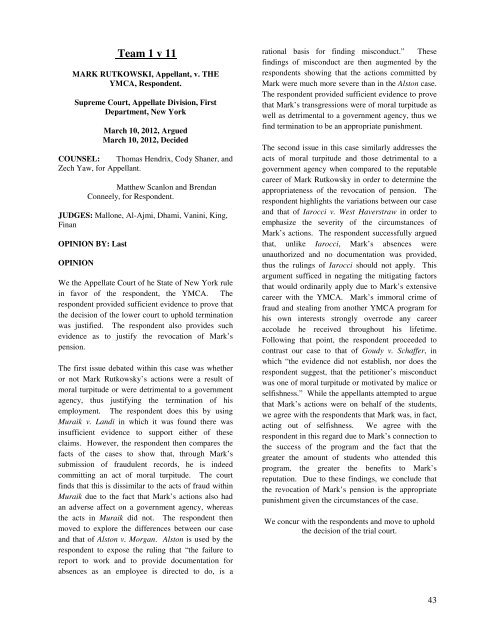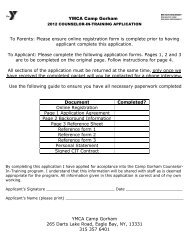2012 Conference Executive Record Report.pdf - YMCA of Greater ...
2012 Conference Executive Record Report.pdf - YMCA of Greater ...
2012 Conference Executive Record Report.pdf - YMCA of Greater ...
You also want an ePaper? Increase the reach of your titles
YUMPU automatically turns print PDFs into web optimized ePapers that Google loves.
Team 1 v 11<br />
MARK RUTKOWSKI, Appellant, v. THE<br />
<strong>YMCA</strong>, Respondent.<br />
Supreme Court, Appellate Division, First<br />
Department, New York<br />
March 10, <strong>2012</strong>, Argued<br />
March 10, <strong>2012</strong>, Decided<br />
COUNSEL: Thomas Hendrix, Cody Shaner, and<br />
Zech Yaw, for Appellant.<br />
Matthew Scanlon and Brendan<br />
Conneely, for Respondent.<br />
JUDGES: Mallone, Al-Ajmi, Dhami, Vanini, King,<br />
Finan<br />
OPINION BY: Last<br />
OPINION<br />
We the Appellate Court <strong>of</strong> he State <strong>of</strong> New York rule<br />
in favor <strong>of</strong> the respondent, the <strong>YMCA</strong>. The<br />
respondent provided sufficient evidence to prove that<br />
the decision <strong>of</strong> the lower court to uphold termination<br />
was justified. The respondent also provides such<br />
evidence as to justify the revocation <strong>of</strong> Mark’s<br />
pension.<br />
The first issue debated within this case was whether<br />
or not Mark Rutkowsky’s actions were a result <strong>of</strong><br />
moral turpitude or were detrimental to a government<br />
agency, thus justifying the termination <strong>of</strong> his<br />
employment. The respondent does this by using<br />
Muraik v. Landi in which it was found there was<br />
insufficient evidence to support either <strong>of</strong> these<br />
claims. However, the respondent then compares the<br />
facts <strong>of</strong> the cases to show that, through Mark’s<br />
submission <strong>of</strong> fraudulent records, he is indeed<br />
committing an act <strong>of</strong> moral turpitude. The court<br />
finds that this is dissimilar to the acts <strong>of</strong> fraud within<br />
Muraik due to the fact that Mark’s actions also had<br />
an adverse affect on a government agency, whereas<br />
the acts in Muraik did not. The respondent then<br />
moved to explore the differences between our case<br />
and that <strong>of</strong> Alston v. Morgan. Alston is used by the<br />
respondent to expose the ruling that “the failure to<br />
report to work and to provide documentation for<br />
absences as an employee is directed to do, is a<br />
rational basis for finding misconduct.” These<br />
findings <strong>of</strong> misconduct are then augmented by the<br />
respondents showing that the actions committed by<br />
Mark were much more severe than in the Alston case.<br />
The respondent provided sufficient evidence to prove<br />
that Mark’s transgressions were <strong>of</strong> moral turpitude as<br />
well as detrimental to a government agency, thus we<br />
find termination to be an appropriate punishment.<br />
The second issue in this case similarly addresses the<br />
acts <strong>of</strong> moral turpitude and those detrimental to a<br />
government agency when compared to the reputable<br />
career <strong>of</strong> Mark Rutkowsky in order to determine the<br />
appropriateness <strong>of</strong> the revocation <strong>of</strong> pension. The<br />
respondent highlights the variations between our case<br />
and that <strong>of</strong> Iarocci v. West Haverstraw in order to<br />
emphasize the severity <strong>of</strong> the circumstances <strong>of</strong><br />
Mark’s actions. The respondent successfully argued<br />
that, unlike Iarocci, Mark’s absences were<br />
unauthorized and no documentation was provided,<br />
thus the rulings <strong>of</strong> Iarocci should not apply. This<br />
argument sufficed in negating the mitigating factors<br />
that would ordinarily apply due to Mark’s extensive<br />
career with the <strong>YMCA</strong>. Mark’s immoral crime <strong>of</strong><br />
fraud and stealing from another <strong>YMCA</strong> program for<br />
his own interests strongly overrode any career<br />
accolade he received throughout his lifetime.<br />
Following that point, the respondent proceeded to<br />
contrast our case to that <strong>of</strong> Goudy v. Schaffer, in<br />
which “the evidence did not establish, nor does the<br />
respondent suggest, that the petitioner’s misconduct<br />
was one <strong>of</strong> moral turpitude or motivated by malice or<br />
selfishness.” While the appellants attempted to argue<br />
that Mark’s actions were on behalf <strong>of</strong> the students,<br />
we agree with the respondents that Mark was, in fact,<br />
acting out <strong>of</strong> selfishness. We agree with the<br />
respondent in this regard due to Mark’s connection to<br />
the success <strong>of</strong> the program and the fact that the<br />
greater the amount <strong>of</strong> students who attended this<br />
program, the greater the benefits to Mark’s<br />
reputation. Due to these findings, we conclude that<br />
the revocation <strong>of</strong> Mark’s pension is the appropriate<br />
punishment given the circumstances <strong>of</strong> the case.<br />
We concur with the respondents and move to uphold<br />
the decision <strong>of</strong> the trial court.<br />
43
















